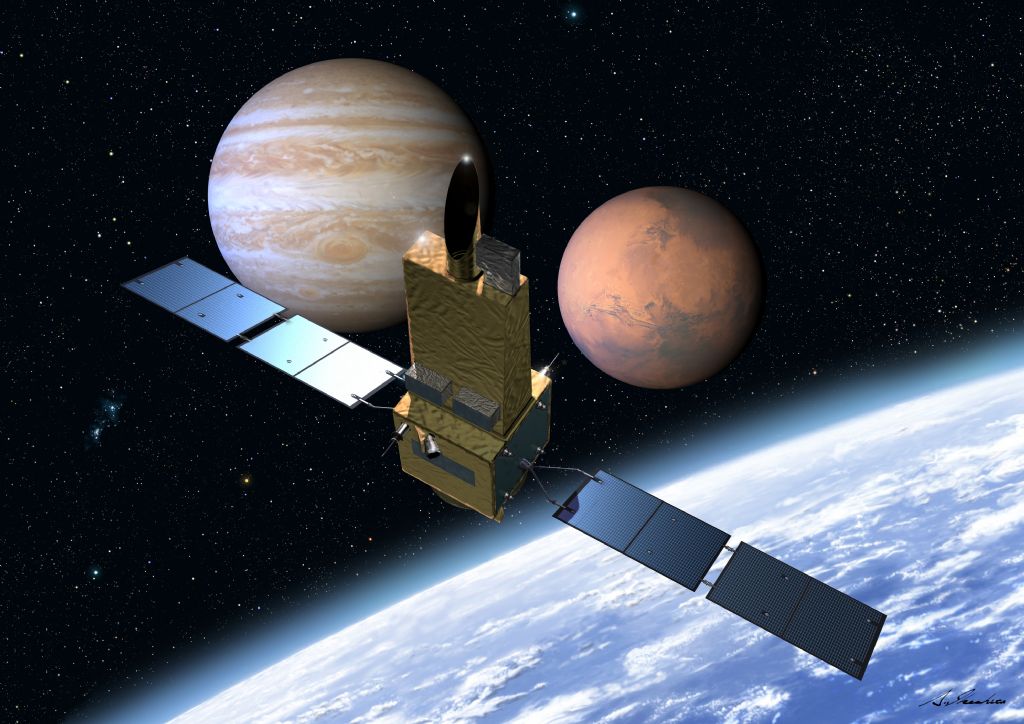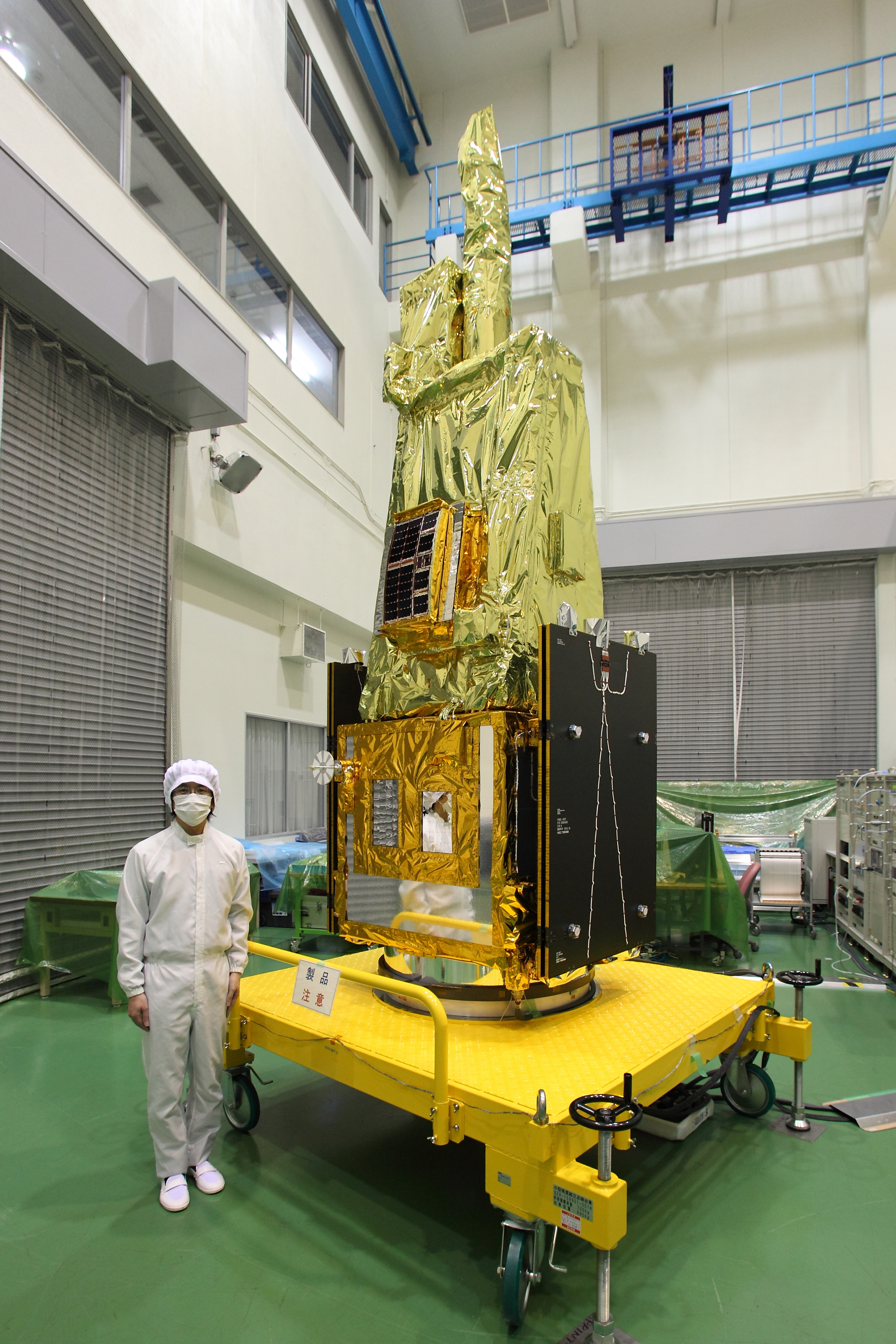Japanese Satellite to Spy On Other Planets from Earth Orbit

Update: Japan's first Epsilon rocket launch carrying the SPRINT-A satellite was canceled Tuesday, Aug. 27, due to an unspecified glitch. Read the full story here: Japan Cancels 1st Launch of Next-Generation Epsilon Rocket
A new satellite will bundle observations of Venus, Mars and Jupiter into one mission — without needing to leave Earth's orbit.
A Japanese probe called SPRINT-A (Spectroscopic Planet Observatory for Recognition of Interaction of Atmosphere), which is scheduled to launch on Tuesday (Aug. 27) aims to better understand how planets in the solar system were formed. Checking out the magnetosphere and atmosphere of other planets could provide a window into Earth's early history, Japanese space agency officials said.
Its long-term observations of these planets will be the first of their kind ever conducted from Earth orbit, according to the Japanese Aerospace Exploration Agency (JAXA). [Our Solar System: A Photo Tour of the Planets]
The puzzle of Mars and Venus
SPRINT-A has a prime mission of one year. At 771 pounds (350 kilograms), it weighs about 30 times less than NASA's venerable Hubble Space Telescope, which can also observe the planets from its perch in Earth orbit.
Unlike Hubble, however, SPRINT will examine planets in extreme ultraviolet rays (UV rays) with a very short wavelength. These rays can only be detected from space, as they are absorbed by Earth's sheltering atmosphere. They're also rarely used in astronomy, leading to likely "innovative discoveries," JAXA officials said in a statement.
Breaking space news, the latest updates on rocket launches, skywatching events and more!
Extreme ultraviolet rays are ideally suited for examining how particles and plasma from the sun (also known as the solar wind) interact with planetary atmospheres. If a planet lacks a strong magnetic field that would deflect the particles, over time the solar wind can cause the atmosphere to bleed gas.
Tracking this process could help scientists better understand, for example, why Mars lost so much of its atmosphere in the past few million years. Multiple missions have detected evidence of ancient water on the planet's surface and even washing through underground canyons. As the atmosphere fled, however, the surface water mostly disappeared except for reserves in the ice caps.
Venus is also a puzzle to scientists. While Venus has a weak magnetic field, unlike Mars, it has an abundance of pressure — about 90 times what is present at the surface level of Earth. The planet is completely cloud-covered, with a runaway greenhouse effect happening underneath. It also has a surface temperature of about 872 F (467 C).
Several Soviet Union probes reached the surface of Venus in past decades, but succumbed within minutes due to the intense heat and pressure there.
Spying on Jupiter
From zones of weak magnetic fields, SPRINT-A will also probe spots in the solar system where this force is quite strong. Jupiter has the most abundant magnetic field and will serve as a spot to examine "the penetration path and depth of solar wind energy," JAXA officials said.
Jupiter also has a volcanic moon, Io, that trails a plasma torus in its orbit. This cloud surrounds Jupiter. As ions and electrons crash into each other, energy is released in the form of ultraviolet light. This is similar to how auroras on Earth are created, according to the University of Arizona's ultraviolet spectroscopy and imaging group.
SPRINT-A will launch aboard the first spaceflight of Japan's Epsilon rocket, a booster that can do many its own health checks. JAXA officials hope the artificial intelligence onboard, among other measures, will lead to cheaper rocket launches in the future.
You can watch the Epsilon rocket launch live online via JAXA webcast streams.
Follow Elizabeth Howell @howellspace, or SPACE.com @Spacedotcom. We're also on Facebookand Google+. Original article on SPACE.com.

Elizabeth Howell (she/her), Ph.D., was a staff writer in the spaceflight channel between 2022 and 2024 specializing in Canadian space news. She was contributing writer for Space.com for 10 years from 2012 to 2024. Elizabeth's reporting includes multiple exclusives with the White House, leading world coverage about a lost-and-found space tomato on the International Space Station, witnessing five human spaceflight launches on two continents, flying parabolic, working inside a spacesuit, and participating in a simulated Mars mission. Her latest book, "Why Am I Taller?" (ECW Press, 2022) is co-written with astronaut Dave Williams.

